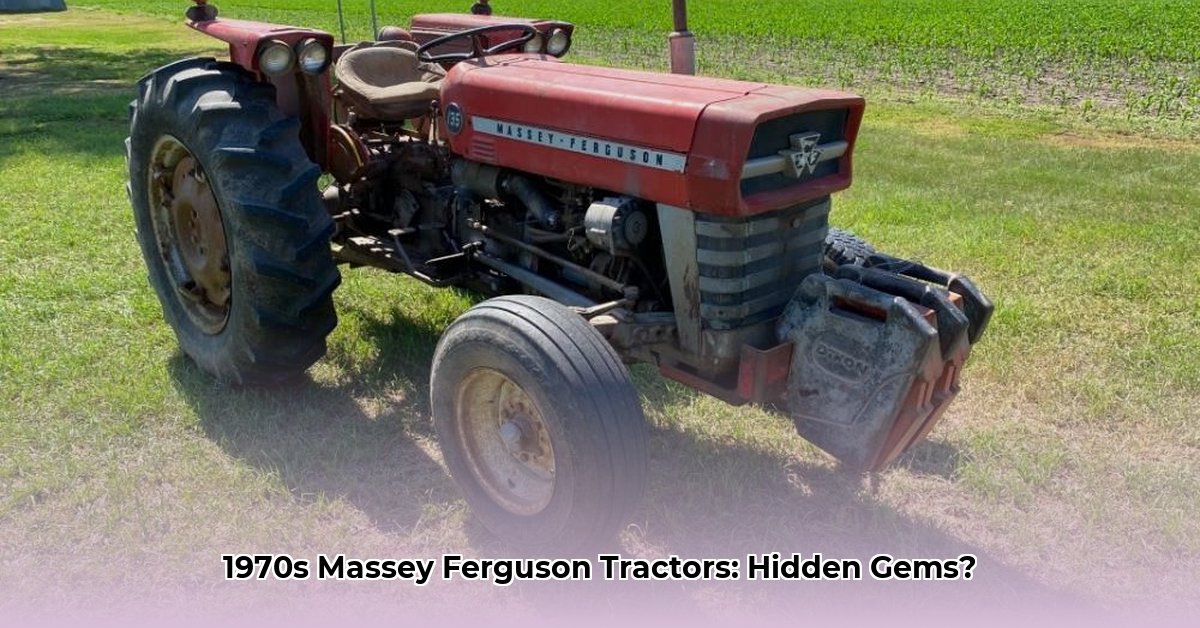
Thinking about adding a classic 1970s Massey Ferguson tractor to your collection? These aren't just machines; they're pieces of agricultural history and, for discerning buyers, potentially sound investments. However, navigating this market requires careful planning and a thorough understanding of the process. This guide provides the actionable steps and insights needed to make informed decisions. For more info on Massey Ferguson tractors, check out this helpful guide: Massey Ferguson Info.
Identifying Desirable Models: Finding the Right Tractor
The 1970s saw Massey Ferguson produce several highly regarded models. Some, like the 135, 150, and 165, are known for their reliability and relative ease of parts sourcing, making them popular choices among collectors. However, rarity can significantly impact value. Less common models might command surprisingly high prices. Before making an offer, thorough research is crucial. Scour online forums, auction sites, and enthusiast groups like Yesterday's Tractors to analyze recent sales and understand current market trends. This groundwork will pay off handsomely. Isn't it a crucial first step to understand your investment's potential return?
Pre-Purchase Inspection: A Checklist for Success
Buying a vintage tractor demands a rigorous pre-purchase inspection. This isn't a casual purchase; it's an investment. Here's a step-by-step checklist:
- Engine Assessment: Listen for unusual noises (knocking, ticking). Check for oil or fluid leaks. A compression test is vital; strong readings indicate a healthy engine, while low readings suggest potential problems requiring costly repairs.
- Transmission Evaluation: Shift through all gears. Smooth transitions are a positive sign; grinding, sticking, or hesitation signals potential transmission issues.
- Hydraulic System Check: Test the lift and three-point hitch mechanisms for smooth operation. Leaks indicate potential trouble spots and needed repairs.
- Bodywork Examination: Inspect for rust, dents, and wear. Minor surface rust might be manageable, but significant rust dramatically increases restoration costs.
- Electrical System Test: Test all lights, gauges, and the starter. A fully functional electrical system is crucial for both safety and operation.
- Tire Condition: Check tire tread depth and overall condition. Worn or damaged tires add to the overall cost of ownership.
Estimating Restoration Costs: Budgeting for Reality
Restoring a vintage tractor can be costly, exceeding initial expectations. Parts are often scarce and expensive, and skilled labor for these specialized machines is not cheap. Factor in specialized tools and unforeseen repairs. Create a detailed budget with a substantial contingency fund; expenses often outpace initial projections. What percentage of your budget should be allocated for unforeseen repairs? A reasonable estimate is around 20-30%, depending on the tractor's condition.
Parts Sourcing Strategies: A Multi-Pronged Approach
Finding parts for a 1970s Massey Ferguson can be challenging. Here’s a strategic approach:
- AGCO Heritage Parts: Check AGCO (Massey Ferguson's parent company) for original parts. While not always the cheapest option, they guarantee authenticity.
- Online Forums & Communities: Join online forums and enthusiast groups for parts leads and advice from experienced restorers.
- Aftermarket Suppliers: Explore aftermarket suppliers. However, rigorously check reviews and compare quality before buying.
- Salvage Yards: Consider salvage yards and tractor graveyards for potential parts finds. This requires patience but can yield significant savings.
Pricing and Market Trends: Understanding Value
Pricing for vintage tractors isn't standardized. Supply, demand, condition, and rarity drive prices. Analyzing recent auction results for similar models is your best approach to determine value. Sites specializing in auction results can provide this valuable market data. How much can a well-researched approach increase your negotiating power?
Case Study: A Real-World Example
A collector purchased a seemingly pristine Massey Ferguson 165. However, beneath the surface, the engine required a complete overhaul—a costly surprise highlighting the importance of a thorough pre-purchase inspection.
Conclusion: Informed Decisions, Rewarding Outcomes
Buying a vintage 1970s Massey Ferguson can be a rewarding experience. However, success depends on thorough planning, research, and realistic budgeting. By understanding the market, preparing for costs, and performing a meticulous inspection, you increase the chances of a sound investment yielding years of enjoyment. Remember, this is more than just acquiring a machine; it's about gaining a piece of history.